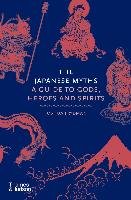The perfect introduction to the world of Japanese myth and legend.
This is a smart and succinct guide to the rich tradition of Japanese mythology, from the earliest recorded legends of Izanagi and Izanami, their divine offspring and the creation of Japan, to medieval tales of vengeful ghosts, through to the modern-day reincarnation of ancient deities as the heroes of mecha anime. While many around the world love Japan's cultural exports, few are familiar with Japan's unique mythology - enriched by Shinto, Buddhism and regional folklore.
Mythology remains a living, evolving part of Japanese society, and the ways in which the people of Japan understand their myths are very different today even from a century ago, let alone over a millennium into the past. Offering much more than any competing overview of Japanese mythology, The Japanese Myths not only retells the ancient stories but also considers their place within the patterns of Japanese religions, culture and history, helping readers to understand the deep links between past and present in Japan, and the ways these myths live and grow.
Joshua Frydman takes the very earliest written myths in the Kojiki and the Nihonshoki as his starting point, and from there traces Japan's mythology through to post-war State Shinto, the rise of the manga industry in the 1960s, J-horror and modern-day myths. Reinventions and retellings of myth are present across all genres of contemporary Japanese culture, from its auteur cinema to renowned video games such as Okami. This book is for anyone interested in Japan, as knowing its myths allows readers to understand and appreciate its culture in a new light.

